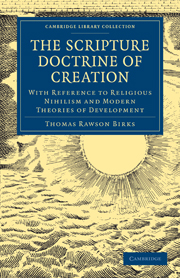 The Scripture Doctrine of Creation
The Scripture Doctrine of Creation Book contents
- Frontmatter
- Contents
- INTRODUCTION
- CHAPTER I ON RELIGIOUS NIHILISM
- CHAPTER II ON RELIGIOUS NIHILISM (continued)
- CHAPTER III THE ALLEGED LAW OF SCIENTIFIC PROGRESS
- CHAPTER IV THE BEGINNING
- CHAPTER V THE CREATION OF MATTER
- CHAPTER VI ON INFINITE SPACE
- CHAPTER VII ON FORCE, LAW, AND NECESSITY
- CHAPTER VIII ON CREATION AND LIFE
- CHAPTER IX ON CREATION AND EVOLUTION
- CHAPTER X EVOLUTION AS AN INDUCTIVE THEORY
- CHAPTER XI ON CREATION BY LAW
- CONCLUSION
CHAPTER I - ON RELIGIOUS NIHILISM
Published online by Cambridge University Press: 29 August 2010
- Frontmatter
- Contents
- INTRODUCTION
- CHAPTER I ON RELIGIOUS NIHILISM
- CHAPTER II ON RELIGIOUS NIHILISM (continued)
- CHAPTER III THE ALLEGED LAW OF SCIENTIFIC PROGRESS
- CHAPTER IV THE BEGINNING
- CHAPTER V THE CREATION OF MATTER
- CHAPTER VI ON INFINITE SPACE
- CHAPTER VII ON FORCE, LAW, AND NECESSITY
- CHAPTER VIII ON CREATION AND LIFE
- CHAPTER IX ON CREATION AND EVOLUTION
- CHAPTER X EVOLUTION AS AN INDUCTIVE THEORY
- CHAPTER XI ON CREATION BY LAW
- CONCLUSION
Summary
The Scripture doctrine of Creation is opposed in these days, not only by Pantheism and open Atheism, but by a rival which claims to be truer and wiser than any of these alternatives. This view may be styled Religious Nihilism. It affirms that Theism, or faith in an Almighty and All-wise Creator, Pantheism, and Atheism, are alike mere guesses in the dark, and that nothing is or can be known of that mysterious Something, which is the origin of the universe.
The Positive Philosophy of M. Comte includes among its main features this intensely negative doctrine. Every science is said to pass through three successive stages. Its unreasoning infancy is theological. It becomes metaphysical in its early youth, and dwells uselessly on abstract ideas of substance, force, quality, and causation. In its full manhood it puts away both metaphysics and theology as childish things, shadows where no certainty can be gained, and confines itself to the task of observing phenomena, and grouping them skilfully together. This view is said to result from the known progress and history of every part of science. But its main proof is sought in the many controversies of religious creeds and metaphysical theories, when compared with the rapid and steady growth of physical science.
The Positive Philosophy is thus an open foe to all religion, unless its newly-devised worship of “collective humanity” is to share in that sacred name.
- Type
- Chapter
- Information
- The Scripture Doctrine of CreationWith Reference to Religious Nihilism and Modern Theories of Development, pp. 6 - 34Publisher: Cambridge University PressPrint publication year: 2009First published in: 1872


